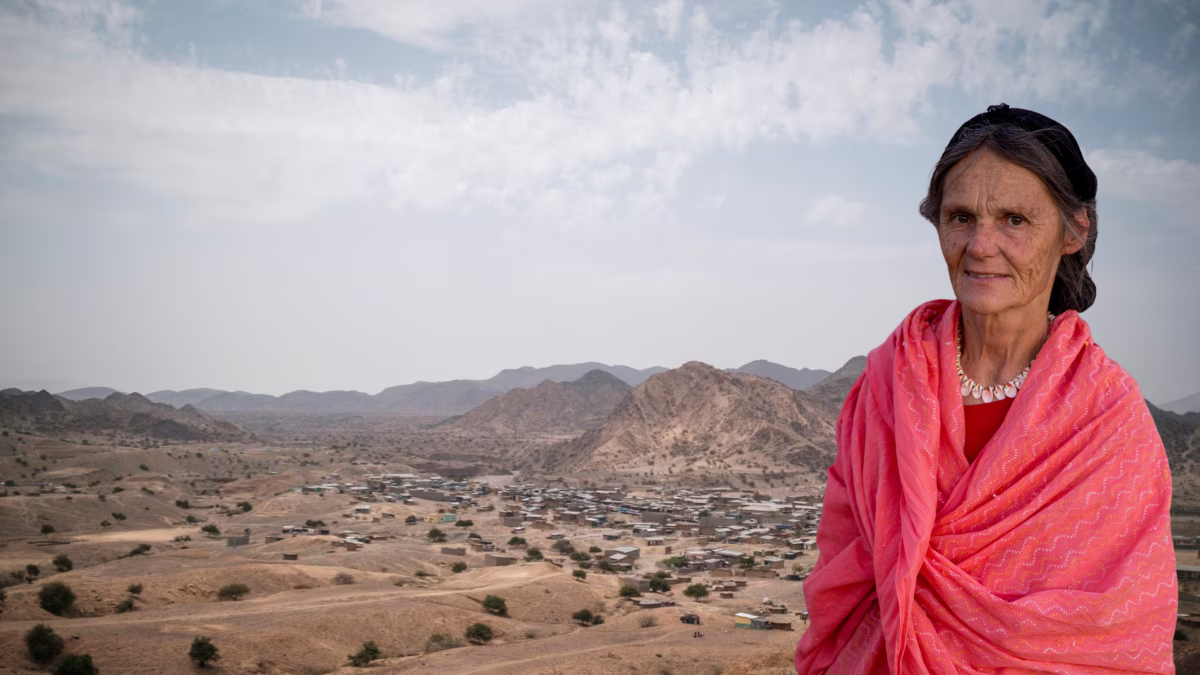
ETHIOPIA
Valerie Browning
Valerie Browning visits Australia and shares an update.
Every Tuesday, the team at Anglican Overseas Aid gathers for a devotional session. Recently, we were honoured to host Valerie Browning, who was visiting from Ethiopia's remote regions.
Our staff were captivated as she shared insights from her 30-year tenure with our partner, the AFAR Pastoralist Development Association (APDA).
Valerie vividly described the challenging conditions: ‘Where I live, no roads exist. We don’t have clinics, we walk, we take camels. We go house to house to vaccinate and assist with maternal health. We have a mobile education system. If the community moves, the blackboard is on the camel and off it goes.’
Known as Maalika by the AFAR people, Valerie has become an integral part of this nomadic tribe over the past three decades. Her journey began at the age of 22 when the harsh reality of Ethiopia's famine contrasted starkly with the abundance of her native Sydney.
‘I couldn't believe that people were going to die for lack of food – having come from Sydney, where there was chocolate, ice cream, whatever you wanted, on every corner.’
In 1989 Valerie, a trained nurse and midwife, married Ismael Ali Gardo, an AFAR community member. Together they founded APDA in 1994, an organisation committed to securing basic human rights for the AFAR people – health, education, clean water, and market income.
The AFAR are no strangers to adversity. They inhabit one of Earth's hottest regions, a land marred by conflict, including the recent two-year civil war in Tigray that encroached upon their territory, resulting in countless deaths and displacements. Beyond war, they face constant health threats, such as the resurgence of cholera and the devastating impacts of climate change on their livestock and livelihoods.
Yet Valerie speaks of resilience and solutions. Addressing food scarcity exacerbated by drought, she reports, ‘We recently taught AFAR women to cook spinach and feed it to their children. They said, “No, no, no, that’s a leaf, we don’t eat that.” But when they ate it, they understood this would be very good for children. We’re working on that because we now have a serious malnutrition situation.’
Drought is not the only reason food is so scarce. During the two-year conflict, the market and the merchants the AFAR relied so heavily upon for fruit, vegetables, and dry commodities disappeared; in an instant, they had to completely change their way of life.
‘To do this, we started a base of co-operatives,’ Valerie explains. ‘We now have 32 co-operatives linked to us who are working on food security in their own communities. Where there’s enough water, we’ve started growing things like onions, tomatoes, bananas, paw paw, mango, and other vegetables like spinach. Where they’ve never grown in history, these people have never seen onions growing.’
Not only is this assisting with food security, but it is contributing to their local economy; with no local economy, Valerie believes the AFAR will disappear. She shares an inspiring tale of a woman who emerged as a vital contributor to the AFAR economy despite the ravages of war.
‘The husband, as soon as the fighting started, went to the war front to defend the land, to defend the children. Her job was to pick up the children and run. She did that, she arrived at a camp in a shocking condition, almost dead. We immediately gave her food along with her children, two who were malnourished.
‘Her husband was killed in the war, so she knew she had to do something. She has now started a micro-finance initiative. She set up a little tea shop, literally on the street, but now she’s got a little house. She is one of the remarkable women changing the market from being dominated by people from other regions to being controlled by AFAR women.
‘I’ve been to her tea shop, she is a very funny woman. It’s wonderful to see her as she is now compared to the misery and huge problems she’s been through. She has six children and is now both mother and father – and it looks like she’ll manage.’
Such stories exemplify the essence of the AFAR people and APDA. In the face of despair, they discover paths to hope. It's our privilege to support Valerie and APDA, standing with a community that battles daily for its future.





